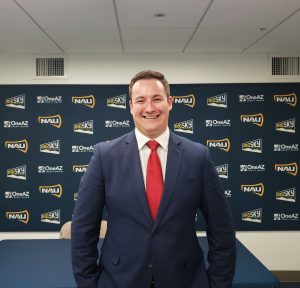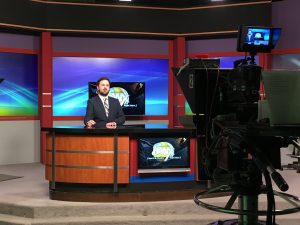- Slug: Sports-Struggling Sports Journalists, about 1,700 words.
- Photo available.
By Griffin Fabits
Cronkite News
PHOENIX – The suspension of the NBA on March 11 jarred the sports world. Major League Baseball was next, suspending its spring operations. The NCAA followed suit, canceling its men’s and women’s postseason tournaments.
Fans have shuddered at what the coronavirus is doing, and what it will do, to the sports landscape. But this global pandemic impacts far more than players or coaches. Peeling the layer back further shows just how difficult this has become for those who work in sports.
Cronkite News spoke to nine people who work in the sports journalism industry, all who have been greatly impacted by the sudden suspension of sports. Here are their stories.
Leo Goldman, sports reporter in Montana
Goldman, a sports reporter and anchor for ABC and Fox affiliates in Montana, was in the midst of covering four classes of the high school basketball state tournament before increasing fears of the coronavirus derailed it. At the time of the decision, no cases had been reported in Montana, but state officials were erring on the side of extreme caution.
Teams were named co-champions, sports came to a screeching halt, and so did Goldman’s work covering high school athletics.
“We’ll start with my job title,” he said. “I’m a sports reporter and sports anchor. I will not be doing that for the foreseeable future.”
He has been reassigned as a community news reporter, which will decrease his pay.
“With sports, we earn a lot of overtime,” he said. “My check is going to go down about $150 every two weeks. I have no experience in news. This is going to be a whole new world for me.”
Unfinished assignments he has as a sports reporter must continue to be handle, such as a series that highlights the best student-athlete performances of the week.
“Those still have to get done,” he said. “How are we supposed to talk to these kids, get the interviews, get the b-roll? That’s just going to be impossible.”
The uncertainty is incredibly alarming, he said.
“There is not a number on the scale that will accurately describe how worried I am,” he said. “I’ll be 100 percent honest with you. I’m terrified.”
Tyler Henry, play-by-play broadcaster
Henry, three months removed from the Cronkite School, had three jobs lined up in Colorado. He was a play-by-play broadcaster calling baseball games for the University of Northern Colorado, he called high school games on the side, and he drove for Lyft.
“I got to work UNC’s first weekend series,” he said. “I was going to be doing all the home games. So I got to do a four-game series and I came home (to Kansas) for what was supposed to be a week-and-a-half-long visit. But then everything got shut down.”
He had gigs lined up, and steady paychecks to rely on, until late-May.
“The entire state of Colorado, two hours after I found out the WAC had shut down, they said all high school athletics for the spring had been suspended.”
The University of Northern Colorado announced on March 19 that all spring competitions are cancelled.
“When I woke up a week ago, I had three jobs,” Henry said. “Now, I’ve got nothing.”
Henry is planted in Kansas for the time being. Jobless for the foreseeable future, he’s considering working at Target, where he worked for six years during high school and college.
Eric Falkner, freelance director for Fox Sports Arizona
A week ago, Falkner had a 162-game baseball schedule laid out in front of him. He’s since been thrust into a world of uncertainty.
“I have at least enough surplus to pay the bills for probably three months,” he said. “If it extends much past eight to 10 weeks, I don’t know. If it gets past that, it’s going to be a problem.”
Falkner was slated to direct Diamondbacks and Coyotes games. He had done directing for entertainment and corporate events, but currently, “pretty much our entire industry is frozen.”
Faulkner is also a freelance web developer, and he’ll take any work he can stumble upon in that field.
“I’m just trying to find whatever freelance work I can get.”
Amy Kelso, owner of Enyo Productions
Kelso owns her own company that supplies technicians to work television sporting events. She’s also a unit production manager for the Pac-12 Conference. She was slated to work all of spring training, which she had booked for nearly a year.
“We’re not working (now),” she said. “We’re not making any money. We were basically laid off on Friday.”
Kelso said she’s looking for part-time work anywhere, “if they don’t close every place down.”
Her worries are “way off the charts,” she said. “If sports don’t start back up in April, it’s going to be a disaster.”
Toby Finch, president of IATSE Local 748
Finch is the president of an organization that represents “the sports broadcast and technician industry,” he said. He oversees the contracts that his workers have with different employers.
“As you can probably imagine,” he said, “I am living with my phone pretty much attached to my ear.”
Finch oversees more than 200 employees, all whom have growing concerns about their job security.
“In the grand scheme of things, sport is entertainment. But, for us, this is our livelihood.”
Braeden Mueller, intern for Myrtle Beach Pelicans
Muller, a December graduate, joined the Pelicans, the Class-A Advanced affiliate of the Chicago Cubs, as a community relations and marketing intern, in January. He and the rest of the communications team were readying for a season that has since been postponed.
Because of it, all “non-essential workers and interns” were furloughed days after the MLB suspended its season.
“When I first got the news, I knew it was coming, but my first thought was, ‘How can I pay the bills?’”
The Pelicans front office reached out to local businesses in the early days, asking if they would take on the recently furloughed employees for the time being. Mueller was placed at an amusement, tourism shop in Myrtle Beach. It’s not what he envisioned when he moved to South Carolina, but at this point, a paycheck is a paycheck.
“The longer this goes,” he said, “the more it sucks. It’s out of our control. I might try to find two jobs to help work and stay busy, but I’m just fully grateful that the organization is trying to take care of us as best as it can during this time.”
Hailey Koebrick, University of San Diego’s athletics department
Koebrick, a communications and creative content assistant, was gearing up for a postseason run with the University of San Diego’s women’s basketball team. After a one-point loss in their conference tournament championship game, the Toreros had positioned themselves for a WNIT bid, something they hadn’t done in years.
Then, the coronavirus canceled their season.
“How do you transition from what was going to be this great postseason,” said Koebrick, who’s also the team’s sports information director, “and how do you celebrate that and post about it without being tone-deaf or disrespectful?”
Koebrick specializes in video, but has no content to work with now. A part-time, hourly-wage worker, she’s working from home, toying with how to come up with as much creative and fresh content as she can.
“I’m trying to come up with, is there a way to create a podcast that is done remotely,” she said. “Can we go through the archives of all of the footage I’ve taken over the past nine months to find good snippets of reaction stuff to cut, of them goofing off in the studio? We have a lot of players with quirky personalities and are trying to showcase that in different ways.”
Koebrick’s part-time status worries her, so much to the point she’s considered finding another part-time job in town.
“It’s hard to gauge how much you should be worried about something when you don’t have a timeline of how long this will go on.”
Jose Romero, Associated Press freelancer
Romero is a father to three young children. He’s a freelancer for the Associated Press – “the most-used stringer they have” – who had spring training and hockey coverage lined up for several weeks.
When there are no sports to write about, no games to cover, the paychecks stop rolling in. The Associated Press honored some of the events he was going to cover by picking up the tab and paying him regardless.
“It sure would be nice to continue to get paid in some way, shape or form, but I’m not a full-time employee,” Romero said. “I’m not on staff. I’m not on the payroll.”
He’s also juggled side-gigs, writing game previews and recaps for several publications, as a way to make “a chunk of change.” But that, too, has been taken from him.
He’s moderately concerned, he said, but grateful that his wife has a good-paying job. He’s begun a search for a new job, for the time being, one that can be done remotely so he can watch his children during the day.
The most upsetting thing to him is that what he’s done for the last 20-plus years, what he’s made a living doing, has suddenly vanished.
“The hardest part of it is just not being able to go out and be at games and do what I have done for 23 years,” he said. “That I’m paid for it was always a bonus.”
Eric Newman, sports reporter for Times Media Group
Days after professional leagues started suspending play, Newman was covering the Boras Classic, a high school baseball showcase tournament in the East Valley. How eerie of a feeling it was for all involved, who were unsure if this was the last baseball they’d see for quite some time.
“People were just so happy to be able to watch sports,” Newman said of the tournament. “Even if for a day, things were just a little bit more normal.
“While it was fun, you could sense a bit of impending doom that people didn’t really know exactly what was coming.”
Days after speaking to Cronkite News via phone interview, Newman announced on Twitter that he had been “let go” by Times Media Group on March 20.
“I know journalists, among other professions, are dealing with similar layoffs due to the virus that is changing people’s lives and health all over the world,” he said on Twitter.
Newman had some sports coverage in the works, mainly how athletes and coaches were responding to the ramifications of the virus. But with sports on pause, he had been given more community news assignments, covering the towns of Glendale and Peoria.
“I’m worried about it some,” Newman said on March 17. “There are so many more important things going on right now. Sports, as a necessity, is just in the background.
“I would assume at some point, it’ll all come back. We’ll see when.”
The answer as to when sports and regular life will intertwine again remain a mystery.

